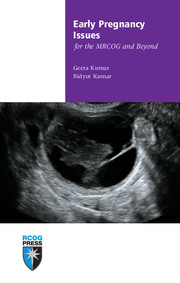Book contents
- Frontmatter
- Contents
- Dedication and acknowledgement
- About the authors
- Abbreviations
- Preface
- 1 Embryogenesis and physiology
- 2 Miscarriage
- 3 Recurrent miscarriage
- 4 Ectopic pregnancy
- 5 Trophoblastic disease
- 6 Hyperemesis gravidarum
- 7 Abdominal and pelvic pain in early pregnancy
- 8 Prescribing issues
- 9 Ultrasound and screening
- Further reading
- Index
- Published titles in the MRCOG and Beyond series
8 - Prescribing issues
Published online by Cambridge University Press: 05 July 2014
- Frontmatter
- Contents
- Dedication and acknowledgement
- About the authors
- Abbreviations
- Preface
- 1 Embryogenesis and physiology
- 2 Miscarriage
- 3 Recurrent miscarriage
- 4 Ectopic pregnancy
- 5 Trophoblastic disease
- 6 Hyperemesis gravidarum
- 7 Abdominal and pelvic pain in early pregnancy
- 8 Prescribing issues
- 9 Ultrasound and screening
- Further reading
- Index
- Published titles in the MRCOG and Beyond series
Summary
Pregnancy, especially early pregnancy, is one of the most challenging situations in which clinicians prescribe medication. Fear of potential harm to the unborn is widespread among women as well as prescribers, leading to reluctance in both prescribing and compliance. However, it is vital to put the perceived teratogenic risks of medications into perspective with the risks of an untreated medical condition endangering maternal and fetal condition.
Approximately 2% of all pregnancies in the UK are associated with congenital anomalies and, while only a small minority of these are associated with administration of medicines in and around pregnancy, these, being potentially avoidable, constitute a crucial group. Almost 50% of all pregnant women are prescribed some form of medication other than a vitamin or nutrient supplement during pregnancy.
The effect of a drug on pregnancy depends on various factors including the drug itself, the dose used, the time of exposure to the drug and presence of pre-existing maternal risk factors. Exposure to a toxin during the pre-embryonic phase (up to 17 days post-conception) when the cells are rapidly multiplying either results in a miscarriage owing to death of the embryo or survival of a fetus without any harmful consequences: the ‘all or nothing’ effect. Exposure to a drug during the embryonic phase from 18 days to 8 weeks postconception can result in permanent organ damage (teratogenicity) and this effect may be dose-dependent. Beyond 8 weeks, if the fetus is exposed to drugs, it is unlikely to result in significant organ damage, although certain subtle changes in the growing organs such as the brain, kidneys or gut, may go undetected until late in life.
- Type
- Chapter
- Information
- Early Pregnancy Issues for the MRCOG and Beyond , pp. 103 - 109Publisher: Cambridge University PressPrint publication year: 2011



